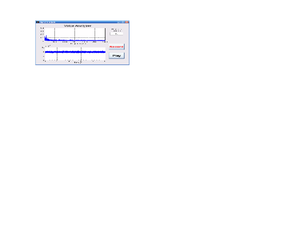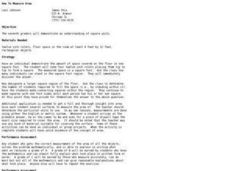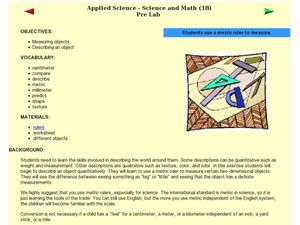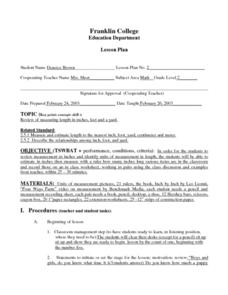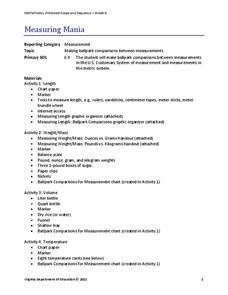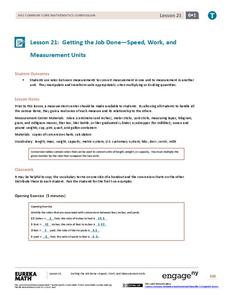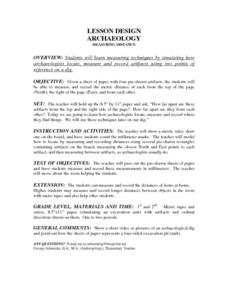Curated OER
Measuring Yourself Using the Metric System
Students measure using the metric system. In this geometry lesson, students solve problems using grams, meters and liters. They convert between the US units of measurements and the Metric System.
Santa Monica College
Introducing Measurements in the Laboratory
We use basic units of measurement to break down things and communicate clearly. The first lesson in an 11-part series teaches the proper way to measure various items. It starts simply with measuring the dimensions and areas of geometric...
Curated OER
Does it Measure Up?
Use this fun activity with youngsters learning how to use rules for measurement. Each is provided with six steps that direct them to draw specific things with specific heights or lengths. For example, they start by drawing a tree that is...
Curated OER
Reading a Metric Ruler
In this metric ruler worksheet, students read metric rulers. They determine the number of centimeters, millimeters, and meters. This two-page worksheet contains 18 problems.
Curated OER
How To Measure Area
Geometers learn how to measure the area in square units. They use the floor in the classroom as a visual to measure a square foot area. They use classmates to fill the space and expand the measured area square foot by square foot until...
Curated OER
Measurement and Conversion of Units in a Recipe
In a cross-curricular measurement and literacy lesson, your class will identify and compare cooking measurement instruments. They read a recipe and sequence a set of similar instructions in which the steps have been mixed up....
Curated OER
Back To the Basics: Measurement
Lead the class in a review of the basic concepts and procedures involved in measuring length, weight, and volume. After whole group instruction, small groups and individuals practice measuring by completing a variety of fun activities...
Curated OER
Using a Metric Ruler
Students explore measuring with metric rulers. In this math instructional activity, students measure two-dimensional objects using metric units.
Curated OER
The Metric System
Students practice converting metric measurements by completing the activities listed in this lesson. They first practice measuring common objects. They then convert metric measurements using the included worksheet.
Curated OER
Measure Up!
Discover ways to measure items without standard tools. In this measurements lesson, learners estimate how long certain objects are by measuring with a non-standard measuring tool. Students check their estimates with a ruler and share...
Curated OER
Measuring Activities
Students measure using both metric and standard measures. They convert from one standard to the next while measuring distances in their home or classroom.
Curated OER
Measurements - Franklin College
Second graders review measurements in inches and practice measuring different objects. As a class, they estimate various objects in their classroom and compare their estimation to the actual measurement. To end the instructional...
Curated OER
Measuring, Drawing and Naming Angles
Upper graders examine all angles. In this angle lesson, pupils practice measuring, drawing, and naming angles. They create posters regarding angle vocabulary.
Curated OER
Making Predictions About Measurement
Upper graders experiment with measurement. They estimate the length, volume, and weight of various objects, then rotate through stations making predictions concerning measurements and then testing their predictions.
Virginia Department of Education
Measuring Mania
Conversion immersion — it's measuring mania! A set of four activities teaches scholars to convert between customary and metric units. Resource covers unit conversions in length, temperature, weight/mass, and volume.
EngageNY
Getting the Job Done—Speed, Work, and Measurement Units
How do you convert from one measurement to another? Pupils use unit rates to convert measurements from one unit to another in the 21st segment in a 29-part series. They convert within the same system to solve length, capacity,...
California Academy of Science
How Big is Big?
In a math or life science class, "mini-me" models are created with cardstock to reflect a 1:10 scale of students' bodies. Learners measure each others' heights with meter sticks, and then reduce the size by 10. After this exercise, they...
Curated OER
Shaquille O'Neal Hand & Foot Span
If Shaquille O'Neal wears a size-20 shoe, how big are his hands? Learners will use the average ratios of foot length to hand span to calculate the hand span of Shaq, but first, they have to collect the data! They will...
Curated OER
All About Measuring with the Metric System
Students discover the metric system through video clips and Internet activities. In this measurements lesson, students practice using the units of measure for the metric system and compare them to the less popular English system....
Curated OER
Lesson Design Archaeology- Measuring Distance
Young scholars measure and write specific metric distances. In this archaeology lesson, students are given specific artifact locations on a map and measure the distance using millimeters.
Curated OER
Metric Me!
Students experience measuring things without the system of inches or millimeters. They utilize a ruler to measure or a body part to measure at least three body parts such as your ear height, finger length of foot width. Students...
Curated OER
The Ruler, The King of Measurement
First graders learn how use a ruler to measure common items. In this measurement lesson, 1st graders examine the numerical markings on rulers and learn that each number stands for a unit of measure. They measure 5 classroom items after...
Curated OER
Making Metric And Customary Rulers
Students create a ruler for the purpose of measurement using the standard and metric systems. The rulers are of different lengths and are compared to one another. Then students make conversions of different lengths using both systems of...
Curated OER
The Amazing Inch and Measuring Up!
Fifth graders study the metric and customary systems of measuring length with rulers, meter / yardsticks, and tape measures. They determine area of polygons and surface area and volume of three-dimensional shapes. They list as many...
